欧美企业面试题及面试技巧电子教案
- 格式:doc
- 大小:40.50 KB
- 文档页数:27
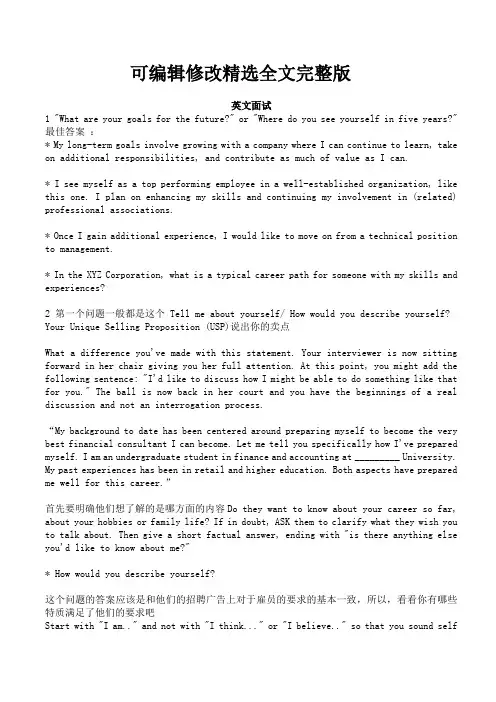
可编辑修改精选全文完整版英文面试1 "What are your goals for the future?" or "Where do you see yourself in five years?" 最佳答案:* My long-term goals involve growing with a company where I can continue to learn, take on additional responsibilities, and contribute as much of value as I can.* I see myself as a top performing employee in a well-established organization, like this one. I plan on enhancing my skills and continuing my involvement in (related) professional associations.* Once I gain additional experience, I would like to move on from a technical position to management.* In the XYZ Corporation, what is a typical career path for someone with my skills and experiences?2 第一个问题一般都是这个 Tell me about yourself/ How would you describe yourself? Your Unique Selling Proposition (USP)说出你的卖点What a difference you've made with this statement. Your interviewer is now sitting forward in her chair giving you her full attention. At this point, you might add the following sentence: "I'd like to discuss how I might be able to do something like that for you." The ball is now back in her court and you have the beginnings of a real discussion and not an interrogation process.“My background to date has been centered around preparing myself to become the very best financial consultant I can become. Let me tell you specifically how I've prepared myself. I am an undergraduate student in finance and accounting at _________ University. My past experiences has been in retail and higher education. Both aspects have prepared me wel l for this career.”首先要明确他们想了解的是哪方面的内容Do they want to know about your career so far, about your hobbies or family life? If in doubt, ASK them to clarify what they wish you to talk about. Then give a short factual answer, ending with "is there anything else you'd like to know about me?"* How would you describe yourself?这个问题的答案应该是和他们的招聘广告上对于雇员的要求的基本一致,所以,看看你有哪些特质满足了他们的要求吧Start with "I am.." and not with "I think..." or "I believe.." so that you sound selfaware and confident.内部职位竞聘常会被问到如果你没有得到这份工作的话你将会怎么办的问题。
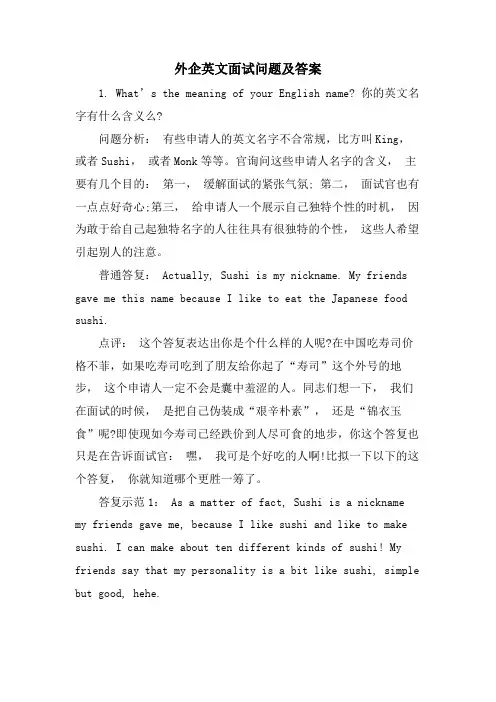
外企英文面试问题及答案1. What’s the meaning of your English name? 你的英文名字有什么含义么?问题分析:有些申请人的英文名字不合常规,比方叫King,或者Sushi,或者Monk等等。
官询问这些申请人名字的含义,主要有几个目的:第一,缓解面试的紧张气氛; 第二,面试官也有一点点好奇心;第三,给申请人一个展示自己独特个性的时机,因为敢于给自己起独特名字的人往往具有很独特的个性,这些人希望引起别人的注意。
普通答复: Actually, Sushi is my nickname. My friends gave me this name because I like to eat the Japanese food sushi.点评:这个答复表达出你是个什么样的人呢?在中国吃寿司价格不菲,如果吃寿司吃到了朋友给你起了“寿司”这个外号的地步,这个申请人一定不会是囊中羞涩的人。
同志们想一下,我们在面试的时候,是把自己伪装成“艰辛朴素”,还是“锦衣玉食”呢?即使现如今寿司已经跌价到人尽可食的地步,你这个答复也只是在告诉面试官:嘿,我可是个好吃的人啊!比拟一下以下的这个答复,你就知道哪个更胜一筹了。
答复示范1: As a matter of fact, Sushi is a nickname my friends gave me, because I like sushi and like to make sushi. I can make about ten different kinds of sushi! My friends say that my personality is a bit like sushi, simple but good, hehe.点评1:与刚刚的答复相比,这个答复表达出你是个什么样的人呢?一个擅长制作寿司的女孩子一定是动手能力比拟强的,而且喜欢做一些琐碎小事的人。
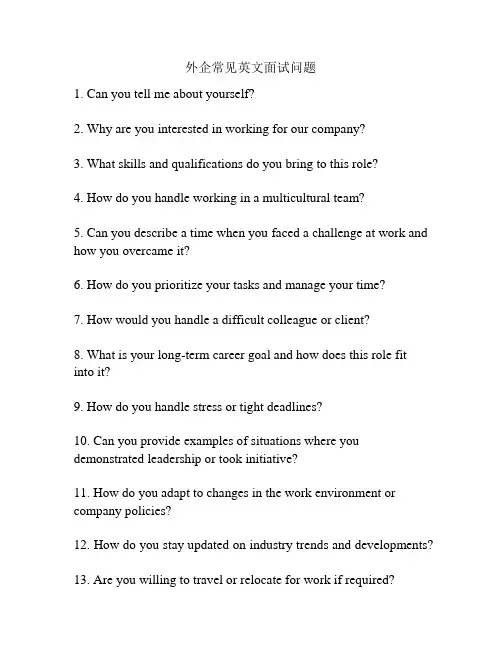
外企常见英文面试问题1. Can you tell me about yourself?2. Why are you interested in working for our company?3. What skills and qualifications do you bring to this role?4. How do you handle working in a multicultural team?5. Can you describe a time when you faced a challenge at work and how you overcame it?6. How do you prioritize your tasks and manage your time?7. How would you handle a difficult colleague or client?8. What is your long-term career goal and how does this role fitinto it?9. How do you handle stress or tight deadlines?10. Can you provide examples of situations where you demonstrated leadership or took initiative?11. How do you adapt to changes in the work environment or company policies?12. How do you stay updated on industry trends and developments?13. Are you willing to travel or relocate for work if required?14. Can you describe a situation where you had to work under pressure and how you handled it?15. What do you know about our company and our competitors?16. How do you handle feedback and criticism?17. Can you provide examples of projects or accomplishments that you are proud of?18. How do you handle conflicts or disagreements in the workplace?19. What do you believe are the most important qualities for success in this role?20. Do you have any questions for us?。
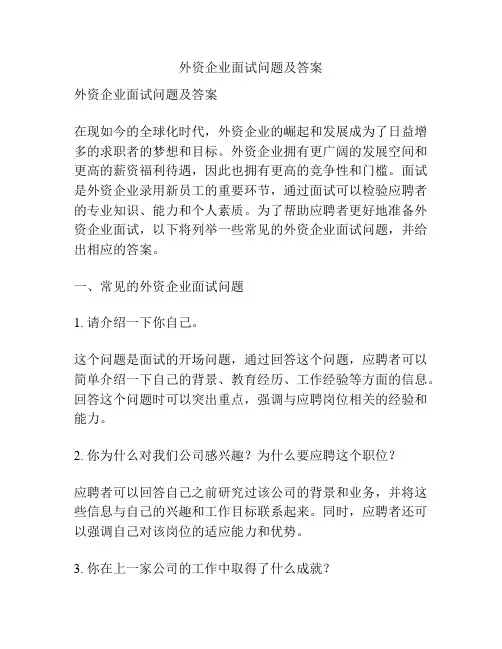
外资企业面试问题及答案外资企业面试问题及答案在现如今的全球化时代,外资企业的崛起和发展成为了日益增多的求职者的梦想和目标。
外资企业拥有更广阔的发展空间和更高的薪资福利待遇,因此也拥有更高的竞争性和门槛。
面试是外资企业录用新员工的重要环节,通过面试可以检验应聘者的专业知识、能力和个人素质。
为了帮助应聘者更好地准备外资企业面试,以下将列举一些常见的外资企业面试问题,并给出相应的答案。
一、常见的外资企业面试问题1. 请介绍一下你自己。
这个问题是面试的开场问题,通过回答这个问题,应聘者可以简单介绍一下自己的背景、教育经历、工作经验等方面的信息。
回答这个问题时可以突出重点,强调与应聘岗位相关的经验和能力。
2. 你为什么对我们公司感兴趣?为什么要应聘这个职位?应聘者可以回答自己之前研究过该公司的背景和业务,并将这些信息与自己的兴趣和工作目标联系起来。
同时,应聘者还可以强调自己对该岗位的适应能力和优势。
3. 你在上一家公司的工作中取得了什么成就?应聘者可以根据自己的工作经验,列举一些能够突出自己绩效的具体案例。
在回答这个问题时,可以强调自己的解决问题能力、团队合作能力和创新能力。
4. 你遇到过的最大的挑战是什么?你是怎么解决的?应聘者可以回答自己在工作中遇到的具体问题或困境,并阐述自己解决问题的思路和方法。
在回答这个问题时,可以突出自己的自我管理和应变能力。
5. 你认为你具备哪些能力和特质,适合这个职位?应聘者可以根据该职位的要求,结合自己的工作经验和个人素质,列举一些能够体现自己适应该职位的能力和特质。
在回答这个问题时,可以强调自己的沟通能力、组织能力和解决问题能力。
6. 你在团队中的角色是什么?你如何与其他同事合作?应聘者可以回答自己在团队中的角色和责任,并具体描述自己与其他同事合作的经验和方式。
在回答这个问题时,可以突出自己的团队合作意识、沟通能力和协调能力。
7. 你对工作中的压力是如何应对的?应聘者可以回答自己在工作中遇到的压力和应对策略,可以结合自己的经验和个人习惯阐述。
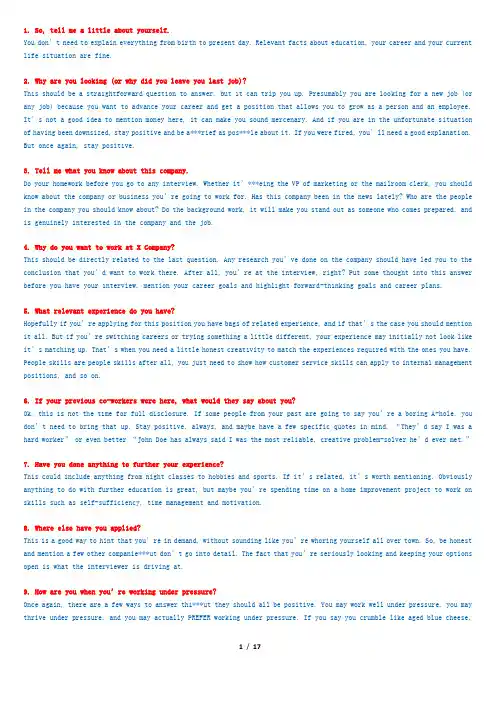
1. So, tell me a little about yourself.You don’t need to explain everything from birth to present day. Relevant facts about education, your career and your current life situation are fine.2. Why are you looking (or why did you leave you last job)?This should be a straightforward question to answer, but it can trip you up. Presumably you are looking for a new job (or any job) because you want to advance your career and get a position that allows you to grow as a person and an employee. It’s not a good idea to mention money here, it can make you sound mercenary. And if you are in the unfortunate s ituation of having been downsized, stay positive and be a***rief as pos***le about it. If you were fired, you’ll need a good explanati on. But once again, stay positive.3. Tell me what you know about this company.Do your homework before you go to any interview. Whether it’***eing the VP of marketing or the mailroom clerk, you should know about the company or business you’re going to work for. Has this company been in the news lately? Who are the people in the company you should know about? Do the background work, it will make you stand out as someone who comes prepared, and is genuinely interested in the company and the job.4. Why do you want to work at X Company?This should be directly related to the last question. Any research you’ve done on the company should have led you to the conclusion that you’d want to work there. After all, you’re at t he interview, right? Put some thought into this answer before you have your interview, mention your career goals and highlight forward-thinking goals and career plans.5. What relevant experience do you have?Hopefully if you’re applying for this position you have bags of related experience, and if that’s the case you should mention it all. But if you’re switching careers or trying something a little different, your experience may initially not look like it’s matching up. That’s when you need a little honest creativity to match the experiences required with the ones you have. People skills are people skills after all, you just need to show how customer service skills can apply to internal management positions, and so on.6. If your previous co-workers were here, what would they say about you?Ok, this is not the time for full disclosure. If some pe ople from your past are going to say you’re a boring A-hole, you don’t need to bring that up. Stay positive, always, and maybe have a few specific quotes in mind. “They’d say I was a hard worker” or even better “John Doe has always said I was the most reli able, creative problem-solver he’d ever met.”7. Have you done anything to further your experience?This could include anything from night classes to hobbies and sports. If i t’s related, it’s worth mentioning. Obviously anything to do with further education is great, but maybe you’re spending time on a home improvement project to work on skills such as self-sufficiency, time management and motivation.8. Where else have you applied?This is a good way to hint that you’re in demand, without sounding like you’re whoring yourself all over town. So, be honest and mention a few other companie***ut don’t go into detail. The fact that you’re seriously looking and keeping your options open is what the interviewer is driving at.9. How are you when you’re working under pressu re?Once again, there are a few ways to answer thi***ut they should all be positive. You may work well under pressure, you may thrive under pressure, and you may actually PREFER working under pressure. If you say you crumble like aged blue cheese,this is not going to help you get your foot in the door.10. What motivates you to do a good job?The answer to this one is not money, even if it is. You should be motivated by life’s noble pursuits. You want recognition for a job well done. You want to become better at your job. You want to help others or be a leader in your field.11. What’s your great est strength?This is your chance to shine. You’re being asked to explain why you are a great employee, so don’t hold back and stay do stay positive. You could be someone who thrives under pressure, a great motivator, an amazing problem solver or someone with extraordinary attention to detail. If your greatest strength, however, is to drink anyone under the table or get a top score on Mario Kart, keep it to yourself. The interviewer is looking for work-related strengths.12. What’s your biggest weakness?If you’re completely honest, you may be kicking yourself in the butt. If you say you don’t have one, you’re obviously lying. This is a horrible question and one that politician s have become masters at answering. They say things like “I’m perhaps too committed to my work and don’t spend enough time with my family.” Oh, there’s a fireable offense. I’ve even heard “I think I’m too good at my job, it can often make people jealous.” Please, let’s keep our feet on the ground. If you’re asked this question, give a small, work-related flaw that you’re working hard to improve. Example: “I’ve been told I occasionally focus on details and miss the bigger picture, so I’ve been spending time laying out the complete project every day to see my overall progress.”13. Let’s talk about salary. What are you looking for?Run for cover! This is one tricky game to play in an interview. Even if you know the salary range for the job, if you answer first you’re already showing all your cards. You want as much as pos***le, the employer wants you for as little as you’re willing to take. Before you apply, take a look at for a good idea of what someone with your specific experience should be paid. You may want to say, “well, that’s something I’ve thought long and hard about and I think someone with my experience should get between X & Y.” Or, you could be sly and say, “right now, I’m more interested in talking more about what the position can offer my career.” That could at least buy you a little time to scope out the situation. But if you do have a specific figure in mind and you are confident that you can get it, I’d say go for it. I have on many occasions, and every time I got very close to that figure (both below and sometimes above).14. Are you good at working in a team?Unless you ha ve the I.Q. of a houseplant, you’ll always answer YES to this one. It’s the only answer. How can anyone function inside an organization if they are a loner? You may want to mention what part you like to play in a team though; it’s a great chance to explain that you’re a natural leader.15. Tell me a suggestion you have made that was implemented.It’s important here to focus on the word “implemented.” There’s nothing wrong with having a thousand great ideas, but if the only place they live is on your notepad what’s the point? Better still, you need a good ending. If your previous company took your advice and ended up going bankrupt, that’s not such a great example either. Be pre pared with a story about an idea of yours that was taken from idea to implementation, and considered successful.16. Has anything ever irritated you about people you’ve worke d with?Of course, you have a list as long as your arm. But you can’t say that, it shows you a***eing negative and difficult to work with. The best way to answer this one is to think for a while and then say something like “I’ve always got on just fine with my co-workers actually.”Use this question as a chance to show that you are a team player: “The only people I have trouble with are those who aren’t team players, who just don’t perform, who complain constantly, and who fail to respond to any efforts to motivate them.”The interviewer is expecting a response focused on personality and personal dislikes. Surprise her by delivering an answer that reflects company values17. Is there anyone you just could not work with?No. Well, unless you’re talking about murderers, racists, rapists, thieves or other dastardly characters, you can work with anyone. Otherwise you could be flagged as someone who’s picky and difficult if you say, “I can’t work with anyone who’s a Bronco’s fan. Sorry.”18. Tell me about any issues you’ve had with a previou***oss.Arrgh! If you fall for this one you shouldn’t be hired anyway. The interviewer is testing you to see if you’ll speak badly about your previous supervisor. Simply answer this question with exteme tact, diplomacy and if necessary, a big fat loss of memory. In short, you’ve never had any issues.The answer to 18 is completely wrong. I am a director at a major media company’s interactive division. Our com pany is expanding and I am almost in a constant state of hiring. I ask a variation of this question in every single interview and if a candidate has never had one issue or disagreement with anyone, (I stated a variation: I ask if it has happened with anyone in the workplace) I peg them as a liar and reject them immediately.I went well with my previou***oss. If there is an conflict, I will be open mind and talk about facts. once decision is made, I execute it well.19. Would you rather work for money or job satisfaction?It’s not a very fair question is it? We’d all love to get paid a Trump-like s alary doing a job we love but that’s rare indeed. It’s fine to say money is important, but remember that NOTHING is more important to you than the job. Otherwise, you’re just someone looking for a bigger paycheck.20. Would you rather be liked or feared?I have been asked this a lot, in various incarnations. The first time I just drew a blank and said, “I don’t know.” That went over badly, but it was right at the start of my c areer when I had little to no experience. Since then I’ve realized that my genuine answer is “Neither, I’d rather be respected.” You don’t want to be feared because fear is no way to motivate a team. You may got the job done but at what cost? Similarly, if you’re everyone’***est friend you’ll find it difficult to make tough decisions or hit deadlines. But when you’re respected, you don’t have to be a complete bastard or a lame duck to get the job done.21. Are you willing to put the interests of X Company ahead of your own?Again, another nasty question. If you say yes, you’re a corporate whore who doesn’t care about family. If you say no, you’re disloyal to the company. I’m afraid that you’ll probably have to say yes to this one though, because you’re trying to be the perfect employee at this point, and perfect employees don’t cut out early for Jimmy’***a***all game.it is situational. if you… ; if you …. Ethics and professionalism22. So, explain why I should hire you.As I’m sure you know, “because I’m great” or “I really need a job” are not good answers here. This is a time to give the employer a laundry list of your greatest talents that just so happen to match the job description. It’s also good to avoid taking potshots at other potential candidates here. Focus on yourself and your talents, not other people’s flaws.23. Finally, do you have any questions to ask me?I’ll finish the way I started, with one of the most common questions a sked in interviews. This directly relates to the researchyou’ve done on the company and also gives you a chance to show how eager and prepared you are. You’ll probably want to ask about benefits if they haven’t been covered already. A good generic one is “how soon could I start, if I were offered the job of course.” You may also ask what you’d be working on. Specifically, in the role you’re applying for and how that affects the rest of the company. Always have questions ready, greeting this one with a blank stare is a rotten way to finish your interview. Good luck and happy job hunting.ponder for a moment, and then ask your interviewer “what aspect of your job do you find most challenging”.I would ask the interviewer, “Why do you like to work here?”24. Where do you want to be in 5 to years?They dont want to hear in the same job you are interviewing for. Ultimately, the HR people are searching for someone who can handle the job now, and has the potential to grow into a high level management job in the future. Do you have those goals too?25. Would you rather work for a big company or a small one?Favorite answer: I’d treat any company like it was my own regardless. Total ownership of the situation can get you a long way.General, the worst answer was “I don’t know.” I’ve since learned that “it depends,” with a couple of examples, is perfectly appropriate附带答案版本:Don't discuss your goals for returning to school or having a family, they are not relevant and could knock you out of contention for the job. Rather, you want to connect your answer to the job you are applying for.最佳答案* My long-term goals involve growing with a company where I can continue to learn, take on additional responsibilities, and contribute as much of value as I can.* I see myself as a top performing employee in a well-established organization, like this one. I plan on enhancing my skills and continuing my involvement in (related) professional associations.* Once I gain additional experience, I would like to move on from a technical position to management.* In the XYZ Corporation, what is a typical career path for someone with my skills and experiences?第一个问题一般都是这个Tell me about yourself/ How would you describe yourself?You walk into the interview room, shake hands with your interviewer and sit down with your best interviewing smile on. Guess what their first question is? "Tell me about yourself." Your interviewer is not looking for a 10-minute dissertation here. Instead, offer a razor sharp sentence or two that sets the stage for further discussion and sets you apart from your competitors.Your Unique Selling Proposition (USP)说出你的卖点Give them "your synopsis about you" answer, specifically your Unique Selling Proposition. Known as a personal branding or a value-added statement, the USP is a succinct, one-sentence description of who you are, your biggest strength and the major benefit that a company will derive from this strength. Here is an example of a Unique Selling Proposition: "I'm a seasoned Retail Manager strong in developing training programs and loss prevention techniques that have resulted in revenue savings of over $2.3Million for (employer's name) during the past 11 years."What a difference you've made with this statement. Your interviewer is now sitting forward in her chair giving you her full attention. At this point, you might add the following sentence: "I'd like to discuss how I might be able to do something like that for you." The ball is now back in her court and you have the beginnings of a real discussion and not an interrogation process.“My background to date has been centered around preparing myself to become the ver y best financial consultant I can become. Let me tell you specifically how I've prepared myself. I am an undergraduate student in finance and accounting at _________ University. My past experiences has been in retail and higher education. Both aspects have prepared me well for this career.”首先要明确他们想了解的是哪方面的内容Do they want to know about your career so far, about your hobbies or family life? If in doubt, ASK them to clarify what they wish you to talk about. Then give a short factual answer, ending with "is there anything else you'd like to know about me?"* How would you describe yourself?这个问题的答案应该是和他们的招聘广告上对于雇员的要求的基本一致,所以,看看你有哪些特质满足了他们的要求吧Try to think about what the interviewers are looking for and keep this in mind as you answer interview questions. Remember the job advert? Were they looking for initiative, a good communicator, someone with good attention to detail? Describe yourself in these terms. Start with "I am.." and not with "I think..." or "I believe.." so that you sound self aware and confident.-----------------------------------------------------------When you're interviewing for an internal position within your company, you may be asked what you will do if you don't get the job. The interviewer wants to know whether you are concerned about just the advancement opportunity or the company. 内部职位竞聘常会被问到如果你没有得到这份工作的话你将会怎么办的问题。
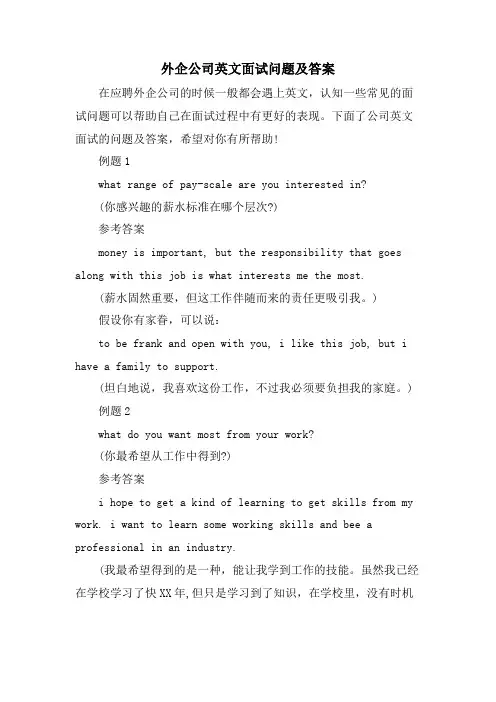
外企公司英文面试问题及答案在应聘外企公司的时候一般都会遇上英文,认知一些常见的面试问题可以帮助自己在面试过程中有更好的表现。
下面了公司英文面试的问题及答案,希望对你有所帮助!例题1what range of pay-scale are you interested in?(你感兴趣的薪水标准在哪个层次?)参考答案money is important, but the responsibility that goes along with this job is what interests me the most.(薪水固然重要,但这工作伴随而来的责任更吸引我。
)假设你有家眷,可以说:to be frank and open with you, i like this job, but i have a family to support.(坦白地说,我喜欢这份工作,不过我必须要负担我的家庭。
) 例题2what do you want most from your work?(你最希望从工作中得到?)参考答案i hope to get a kind of learning to get skills from my work. i want to learn some working skills and bee a professional in an industry.(我最希望得到的是一种,能让我学到工作的技能。
虽然我已经在学校学习了快XX年,但只是学习到了知识,在学校里,没有时机接触到真正的社会,没有掌握一项工作技能,所以我最希望获得一项工作的技能,能够成为某一个行业领域的人士。
)例题3why did you choose us?(你为什么选择到我们公司来应聘?)参考答案as the saying goes, "well begun is half done". your pany is a famous one in the industry and boasts a high reputation. i hope to choose your pany as the beginning of my career. i can not only learn new things, but set a solid foundation for my future career as well.(俗话说“良好的开端是成功的一半”。
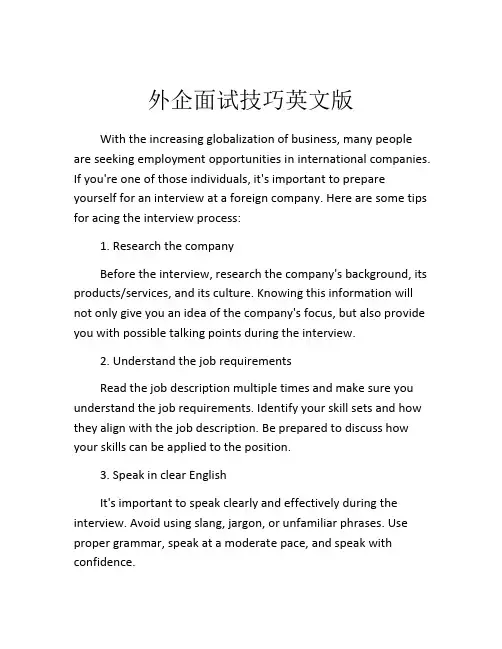
外企面试技巧英文版With the increasing globalization of business, many people are seeking employment opportunities in international companies. If you're one of those individuals, it's important to prepare yourself for an interview at a foreign company. Here are some tips for acing the interview process:1. Research the companyBefore the interview, research the company's background, its products/services, and its culture. Knowing this information will not only give you an idea of the company's focus, but also provide you with possible talking points during the interview.2. Understand the job requirementsRead the job description multiple times and make sure you understand the job requirements. Identify your skill sets and how they align with the job description. Be prepared to discuss how your skills can be applied to the position.3. Speak in clear EnglishIt's important to speak clearly and effectively during the interview. Avoid using slang, jargon, or unfamiliar phrases. Use proper grammar, speak at a moderate pace, and speak with confidence.4. Dress professionallyDressing professionally is important for any interview, but it is especially important for a foreign company. Dress conservatively and avoid wearing trendy or flashy clothing.5. Be punctualArrive on time or even a little early to show that you respect the interviewer's time and that you are reliable.6. Showcase your cultural awarenessDemonstrate your understanding of the company's culture and show that you are aware of cultural differences. This may include respecting local customs, being aware of different holidays, and understanding how communication styles may be different in different cultures.7. Show your flexibilityInternational companies often have a lot of mobility and may require employees to travel or relocate. Show that you are flexible and open to new experiences.8. Provide specific examplesWhen answering questions, provide specific examples of past experiences that relate to the job requirements. This will give the interviewer a better understanding of your skills and how you can contribute to the company.9. Be prepared to discuss salaryMany foreign companies will ask about salary expectations during the interview process. Do your research on the industry and be prepared to discuss a salary range that you feel is appropriate for the position.10. Follow upAfter the interview, send a thank you note or email to the interviewer to express your gratitude for giving you the opportunity to interview. This will also help you stand out among other candidates.In conclusion, preparing for an interview at a foreign company requires understanding the company's culture, job requirements, and being aware of cultural differences. By following these tips, you'll be able to stand out during the interview process and increase your chances of being hired.。
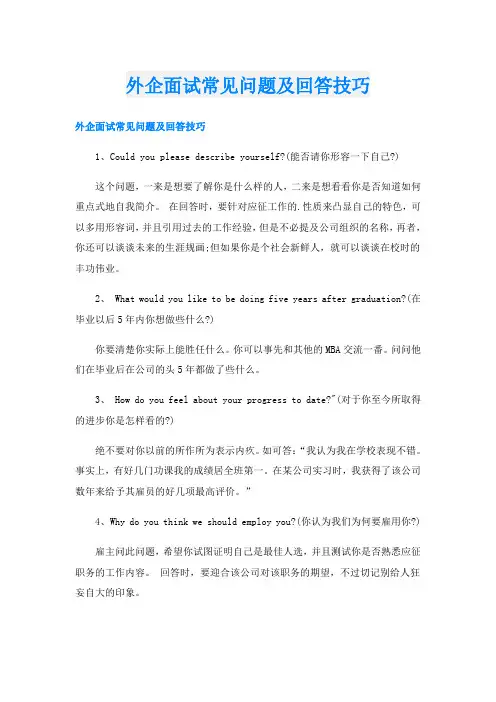
外企面试常见问题及回答技巧外企面试常见问题及回答技巧1、Could you please describe yourself?(能否请你形容一下自己?)这个问题,一来是想要了解你是什么样的人,二来是想看看你是否知道如何重点式地自我简介。
在回答时,要针对应征工作的.性质来凸显自己的特色,可以多用形容词,并且引用过去的工作经验,但是不必提及公司组织的名称,再者,你还可以谈谈未来的生涯规画;但如果你是个社会新鲜人,就可以谈谈在校时的丰功伟业。
2、 What would you like to be doing five years after graduation?(在毕业以后5年内你想做些什么?)你要清楚你实际上能胜任什么。
你可以事先和其他的MBA交流一番。
问问他们在毕业后在公司的头5年都做了些什么。
3、 How do you feel about your progress to date?"(对于你至今所取得的进步你是怎样看的?)绝不要对你以前的所作所为表示内疚。
如可答:“我认为我在学校表现不错。
事实上,有好几门功课我的成绩居全班第一。
在某公司实习时,我获得了该公司数年来给予其雇员的好几项最高评价。
”4、Why do you think we should employ you?(你认为我们为何要雇用你?)雇主问此问题,希望你试图证明自己是最佳人选,并且测试你是否熟悉应征职务的工作内容。
回答时,要迎合该公司对该职务的期望,不过切记别给人狂妄自大的印象。
5、What classes did you like best back in school?(在学校你最喜欢哪门课?)此时,雇主想了解你的学习能力,以及你有兴趣的专业课程是否跟工作扯得上边;此外,个人在求学过程的好恶,会反应在不同的工作岗位上。
回答时,一定要表示自己以好学著称,喜欢学习新知,尤其是与应征工作有关的课程。
6、What do you think are your greatest strengths and weaknesses? (你自认自己最大的优劣势分别为何?)雇主问这样的问题,旨在探知你是否有足够的自我认知,以及你是否是该职务的不二人选。
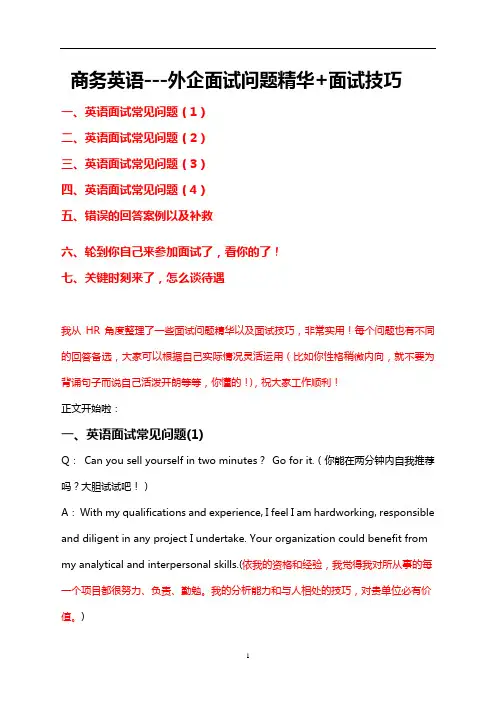
商务英语---外企面试问题精华+面试技巧一、英语面试常见问题(1)二、英语面试常见问题(2)三、英语面试常见问题(3)四、英语面试常见问题(4)五、错误的回答案例以及补救六、轮到你自己来参加面试了,看你的了!七、关键时刻来了,怎么谈待遇我从HR角度整理了一些面试问题精华以及面试技巧,非常实用!每个问题也有不同的回答备选,大家可以根据自己实际情况灵活运用(比如你性格稍微内向,就不要为背诵句子而说自己活泼开朗等等,你懂的!),祝大家工作顺利!正文开始啦:一、英语面试常见问题(1)Q:Can you sell yourself in two minutes?Go for it.(你能在两分钟内自我推荐吗?大胆试试吧!)A:With my qualifications and experience, I feel I am hardworking, responsible and diligent in any project I undertake. Your organization could benefit from my analytical and interpersonal skills.(依我的资格和经验,我觉得我对所从事的每一个项目都很努力、负责、勤勉。
我的分析能力和与人相处的技巧,对贵单位必有价值。
)Q:Give me a summary of your current job description. (对你目前的工作,能否做个概括的说明。
)A:I have been working as a computer programmer for five years. To be specific, I do system analysis, trouble shooting and provide software support. (我干了五年的电脑程序员。
具体地说,我做系统分析,解决问题以及软件供应方面的支持。
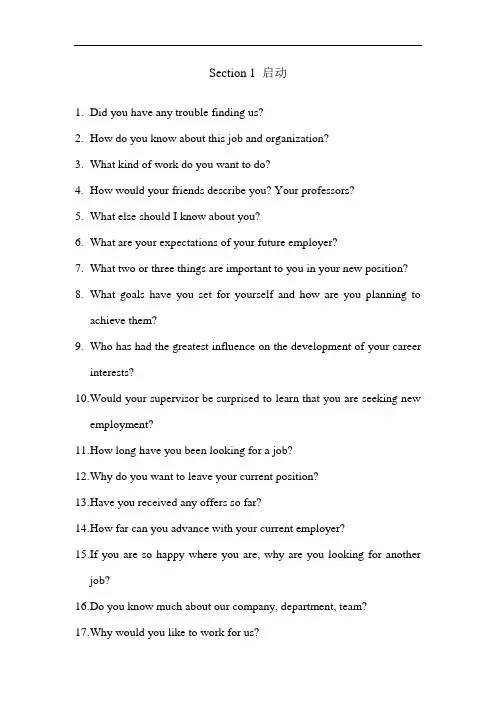
Section 1 启动1.Did you have any trouble finding us?2.How do you know about this job and organization?3.What kind of work do you want to do?4.How would your friends describe you? Your professors?5.What else should I know about you?6.What are your expectations of your future employer?7.What two or three things are important to you in your new position?8.What goals have you set for yourself and how are you planning toachieve them?9.Who has had the greatest influence on the development of your careerinterests?10.W ould your supervisor be surprised to learn that you are seeking newemployment?11.H ow long have you been looking for a job?12.W hy do you want to leave your current position?13.H ave you received any offers so far?14.H ow far can you advance with your current employer?15.I f you are so happy where you are, why are you looking for anotherjob?16.D o you know much about our company, department, team?17.W hy would you like to work for us?18.H ow does this job compare with others you’ve applied for?19.W hat is the ideal position for you in any company?20.B ased on what you know about our industry right now, how does yourideal job stack up against the description of the job you’re applying for?21.I f you could make a wish, what would be you perfect job?22.W hat causes you to lose your temper?23.W hat two adjectives best describe you?24.W hat are your best professional skills?25.I f you were in my position, would you hire you?Section 2 历史1.In your capacity as a _____ at _____ company, what did you actuallydo? Please provide details.2.What do you feel are the biggest challenges facing this field? Thisindustry?3.Tell me about your last (or present) job.4.What do you think it takes for a person to be successful in yourparticular area?5.How long have you been looking for a position?6.How have previous jobs equipped you for greater responsibility?7.What aspects of your current job would you consider to be crucial tothe success of the business? Why?8.What was the least relevant job you have held?9.How long will it take for you to make a contribution?10.W hat did you enjoy most about your last job?11.W hat did you enjoy least about your last job?12.W hat was the biggest pressure on your last job?13.H ave you held other positions like the one you are applying for today?If yes, describe how you expect the positions to be the same.14.I n what ways do you expect them to differ?15.W hat is the most important thing you learned from your previousexperience that you would bring to this job?16.I f there were two things you could change in your last job, what wouldthey be and how would you change them?17.W hy did you leave your last job?18.W hy do you think you were successful in your last job?19.H ow has you r last job changed since you’ve held it?20.P lease describe your last supervisor’s management style.21.I f you could make one constructive suggestion to your last CEO, whatwould it be?22.O f all the work you have done, where have you been the mostsuccessful?23.D escribe to me how your job relates to the overall goals of yourdepartment and company.24.W hat are the most repetitive tasks in your job?25.T o what extent have you automated your last job?26.W hat technical decisions did you have to make?27.W hat decisions or judgment calls did you have to make in these areas?28.W hat were the most important projects you worked on at your lastjob?29.C an you give a ratio for the amount of time you worked alone to theamount of time you worked with others?30.H ow effectively did your boss handle evaluations?31.T ell me about a method you’ve developed to accomplish a job. Whatwere its strengths and weaknesses?32.H ow many hours a week, on the average, do you find it necessary towork to get your job done?33.C an you describe a situation where a crisis occurred and you had toshift priorities and workload quickly?34.H ow do you feel about your present workload?35.H ow do you feel about your manager contributed to your choosing toleave your present job?36.H ow do you think your supervisor will react when you tender yourresignation?37.D escribe the most significant report or presentation you had toprepare.38.W hat idea have you developed and implemented that was particularlycreative or innovative?39.T ake me through a project where you demonstrated_____ skills.40.T ell me about a team project of which you are particularly proud andyour specific contribution.41.T ell me about a difficult decision you had to make.42.W hat made it difficult? What did you learn?43.D escribe the way your department is currently organized.44.W hat was the hardest decision you ever had to make, and how did youhandle it?45.W hat are the most difficult aspects of your current job, and how doyou approach them?46.W hat has been your most important work-related innovation orcontribution?47.W hat caused you the most problems in executing your tasks?48.H ow do you organize and plan for major projects? Recall for me amajor project you worked on. How did you organize and plan for it?49.W hat would you say are some of the basic factors that motivate you inyour work?50.Y ou’ve had little experience in _____, how do you intend to learnwhat you need to know to perform well in this job?第三章工作能力1.Please take me through your professional career.2.Why have you chosen this particular field?3.What aspects of your education do you rate as most critical?4.What would your greatest business champion say about you?5.What would your greatest business adversary say about you?6.What are your long-range goals?7.If we hired you, what are the top three goals you would like to see thiscompany achieve?8.What can you do for us that someone else cannot?9.Have you done your best work yet?10.W hat do you like most about this job?11.W hat aspect of this job is the least appealing?12.H ow do you plan your time?13.W hat are three reasons for your success?14.W hat kind of leader are you? Please provide an example.15.W hat is the title of the person you report to and what are his or herresponsibilities?16.T hink back to a time when you trained a new employee. Tell meexactly what you did to train that employee and bring the person up to the job’s performance standards.17.W hat were the biggest decisions you made in the past six months?18.H ow did you go about making them and what alternatives did youconsider?19.C an you describe a major project with which you encounteredproblems?20.H ow did you resolve them and what were the results?21.D escribe one of the best ideas you have ever sold to a peer orsupervisor. What were your approach and result?22.W hat kinds of obstacles to completing assignments on time do youmost frequently encounter at work?23.W hat strategies have you devised to handle such obstacles?24.H ow do you know you are doing a good job?25.H ow do you prefer to measure performance?26.C an you recall a time when you were less than pleased with yourperformance?27.C an you describe some projects that were a result of your owninitiative?28.W hat prompted you to begin such projects? How did they end up?29.W hat qualifications do you have to make you successful in this field?30.D o you prefer to speak with someone or send a memo?31.H ow do you motivate people?32.G ive an example of a situation in which you failed, and how youhandled it.33.W hat characteristics are the most important in a good manager? Howhave you displayed these characteristics?34.W hat two or three accomplishments have given you the mostsatisfaction?35.D escribe a leadership role of yours and tell me why you committedyour time to it.36.H ave you been in charge of budgeting, approving expenses, andmonitoring departmental progress against financial goals?37.W hat suggestions did you make in your last job to cut costs, increaseprofits, improve morale, increase output, etc.?38.W hat results did you get? How do you know? How did you measureresults?39.W hat would you like to have done more of in your last job?40.W hat specifics strengths did you bring to your last job?41.W hat would you consider the three most significant accomplishmentsin your business life?42.T hink of something that you consider a failure in your career. Whatdid you learn from it?43.C an you think of an example of a lesson you learned from someoneelse’s mistake?44.W hat risks did you take in your last few jobs? What was the result ofthose risks?45.W hat languages do you speak?46.W hat do you think differentiates you from the other applicants for thisjob? Why?47.W hy do you think you’d be a good fit for this job?48.W hat do you do when you are having trouble solving a problem?49.W hat interests you most about this position?50.H ave you ever hired anyone?51.O n what basis do you select a new hire?52.D escribe the people that you hired on your last job. Did they workout(工作进展)? How long did they remain at their jobs?53.H ave you ever fired anyone? On what basis did you fire them?54.H ow would you describe your management philosophy?55.W hat kind of references do you think your previous employer willgive you? Why?56.I f you have complaints about your present employers, and they thinkso highly of you, why haven’t you brought your concerns to their attention?57.T he successful candidate for this position will be working with somehighly trained individuals who have been with the company for a longtime.58.W hat is the most difficult situation you have faced? How did youhandle it?59.H ow did your supervisor get the best performance out of you?60.H ow do you use deadlines in your work?61.H ow would you do this hob differently from other people?62.W hat personality traits do you think are necessary to succeed in thisfield?63.H ave you thought about why you might prefer to work with our firmas opposed to one of the other firms to which you’ve applied?64.W hen some managers make a decision, they often feel a need todefend it. Can you describe a time when you changed a stated decision or opinion because you were persuaded you were wrong?65.W hat would you do differently in your life? Your career?66.I f you could eliminate one responsibility from your last job, whatwould it be?67.A fter being with the same company for so long, do you think it will behard to adapt to a new organization?68.S ome people feel that spending so much time at one job demonstratesa lack of initiative. How do you respond to that?69.W hat are the advantages of staying at one job a long time/70.S ince you were in the same job for such a long time, you’ve probablygrown very comfortable in it — maybe even a bit stale. How would you cope with a new job in a company such as ours?71.Y ou’ve changed jobs quite frequently. How do we know you’ll stickaround if we hire you?72.H ow do you explain the diversity of jobs you’ve had? The positionsdon’t seem to be in a logical progression.73.Y ou’ve been with your current employer for only a short amount oftime. Is this an indication that you’ll be moving around a lot throughout your career?74.H ow long will you stay here at this company?75.W hat strategies have you found to be successful in managing unfaircriticism?76.C an you describe a time when you pushed too hard for a project to thedetriment of the project?77.G ive me some examples of different approaches you have used whenpersuading someone to cooperate with you.78.H ow do you cope with the inevitable stresses and pressures of anyjob?79.W orked effectively under pressure.80.H andled a difficult situation with a coworker.81.W ere creative in solving a problem.82.W ere unable to complete a project on time.83.P ersuaded team members to do things your way.84.H ad to take a stand on an unpopular position.85.W rote a program (or report or strategic plan) that was well received.86.A nticipated potential problems and developed a proactive response.87.H ad to make an important decision with limited facts.88.W ere forced to make an unpopular decision.89.H ad to implement an unpopular decision.90.W ere tolerant of an opinion that was radically divergent from yourown.91.W ere disappointed in your behavior.92.U sed your political savvy to push through a program you reallybelieved in.93.H ad to deal with an irate customer.94.D elegated a project effectively.95.S urmounted a major obstacle.96.S et your sights too high.97.S et your sights too low.98.P rioritized the elements of a complicated project.99.L ost (or won) an important contract or sale.100.Hired (or fired) the wrong person.10佳问题1.Tell me about yourself using only one-word adjectives. The firstquestion cuts through the creative writing of the resume and the stage acting of the interview (none of which is bad, merely obfuscating).The order of the adjectives is as much of a window as the adjectives themselves. The candidate will hit a very detectable pause after he or she has offered up the pertinent ones (usually three to six) and them it’s time to move on to a discussion of “why” to each one of those adjectives. Follow-up questions might include: have you always been that way? For example (name one of the adjectives), have you always been like that? If not, what caused you to change? What are the highs and lows that each of those adjectives have brought you?2.What have been the biggest success and biggest mistake of yourcareer?3.What was the most useful criticism you ever received?4.Describe the best person you ever worked for or who worked for you.5.If your last boss were able to wave a magic wand over your head,what aspect of your performance would he or she fine-tune?6.If you had the opportunity to do the last ten years of your career overagain, what would you do differently?7.Describe the most difficult decision you ever had to make. Reflectingback, was your decision the best possible choice you could have made?Why or why not?8.If I were to speak with your current supervisor, what would he or shesay are your current strengths and weaknesses?9.Take as a given that you got this job, and that you have been doing itfor three to six months, but things are just not working out. We are sitting here discussing the situation. What do you think you would say about what went wrong?10.W hen you’ve had a really good day at work and you go home andkick back and you feel satisfied, what was it about that day that made you feel really good? When you have had a really bad day at work and you go home and feel upset, what was it about that day that made you feel really upset?第四章求职动机1.What motivates you to put forth your greatest effort?2.Describe your “dream” job.3.What is the most important feature to you in a job?4.Please rank the following from most important to least: job duties,hours, distance from work, pay, work environment.5.What has been your greatest accomplishment in a work environmentand why?6.How important are external deadlines in motivating you?7.How do you feel about your present workload?8.Give me an example of a situation where you had to go above andbeyond the call of duty to get something done.9.What do you do when things are slow at work?10.W hat have you learned from your mistakes?11.W hat two or three accomplishments have given you the mostsatisfaction? Why?12.H ow can we best reward you for doing a good job?13.W hy do you think you’ll be successful in this job?14.W hat makes you proud of your work?15.T ell me about a time when you went “out on a limb” in a job.16.H ow do you like to be managed?17.W hat kind of supervisor is likely to get the best performance out ofyou?18.H ow important is it for you to learn new skills?19.W hat new skills would you like to learn?20.D o you consider yourself successful?21.W hat are the most important rewards you expect out of your career?22.W hat is more important to you: the salary or the challenge?23.W hat do you think determines a pe rson’s success in a firm?24.T ell me about a project that really got you excited.25.D o you generally cleat your desk at the end of each day?第五章背景1.What distinguishes a great employee from a good one?2.Do you set performance standards for yourself?3.How do you cope with stress on the job?4.How do you know if you’re doing a good job?5.What do you need from your supervisor?6.How will you communicate your frustration when those needs gounmet?7.Would you rather formulate a plan or carry it out?8.What was the last business or management book you read and whatdid you learn?9.Where or to whom do you turn for help? What resources do you lookfor in completing a task?10.W hat strategies do you use when you have a great deal of work toaccomplish and not much time to do it?11.D escribe a time when you used your intuition to good result in supportof a project.12.W here would you like to go from here in your career, and how do youplan to accomplish your goals?13.I n what ways do you and your supervisor think alike?14.H ow did you handle a relationship important to your organizationwhen it was threatened?15.H ow do you react when someone criticizes you?16.W hat do you do when you have to make an important decision?17.W hat does the word “success” mean to you?18.W hat does the word “failure” mean to you?19.H ow do you of about making important decisions?20.W hat have you learned about working well under pressure?21.D o you anticipate problems or react to them?22.W ould you describe yourself as a risk taker or someone who plays itsafe?23.W hat problems do you have getting along with others?24.R ate yourself on a scale of one to ten.25.W hat is your greatest strength?第六章团队工作1.Define cooperation.2.What kinds of people do you prefer to work with?3.What kinds of people do you find it difficult to work with?4.Tell me about a time when you said no to someone who asked you todrop everything to help them out.5.Tell me about a time when a team fell apart. Why did it happen andwhat did you learn?6.Tell me about a job or project where you had to gather informationfrom many different sources and then synthesize the information in support of a business challenge.7.How do you operate as a team player?8.How do you deal with people with different backgrounds and valuesystems different from your own?9.How do you schedule and commit to quiet time?10.D o you prefer working with others or working alone?11.W hat good or bad work habits did you pick up from your first job?12.H ow do you know when a team has met its objectives?13.D escribe your approach to evaluating risk.14.W hat is one thing a teammate can say to you that are guaranteed tomake you lose confidence in him or her?15.H ow do you get along with superiors?16.H ow do you get along with coworkers?17.H ow do you get along with people you’ve supervised?18.W hat are your team-player qualities? Please be specific.19.W h at have you learned about guarding against “group-think”?20.H ave you developed any special techniques for brainstorming?21.A re you able to predict a people’s behavior based on your reading ofthem?22.T ell me about a specific accomplishment you have achieved as aparticipant in a team.23.T ell me about a time when your team made emotional decisions aboutthe project. What happened and how did you handle it?24.T ell me about an occasion when the team objected to your ideas. Whatdid you do to persuade the team of your point of view?25.A s a team leader how much tolerance do you have for mistakes orfalse steps? In other words, if a team member wanted to do something in a way you were convinced were mistake, how would you weigh the team member’s learning experience against pr otecting the project? 26.H ave you ever been in a team where people overrule you or won’t letyou get a word in edgewise? How do you handle it?27.I n any team, there will always be a range of aptitudes. Not only is thespread of talents obvious, but also team members are in remarkable agreement about the distribution. Put any tem people in room and they will sort themselves out from top to bottom in short order. My question is, do you believe it is useful to the organization to formally rank team members?28.A s a member of a team, how do you see your role?29.A s a member of a team, how do you handle a team member who is notpulling his or her weight?30.T ell me about a time when you had to confront a team member.第七章压力1.What cherished management belief have you had to five up in order toget where you are?2.Tell me about a time when your employer was not happy with yourjob performance.3.Who is the toughest employer you ever had and why?4.Have you ever had to work with a manager who was unfair to you, orwas just plain hard to work with? Please give details.5.What’s more important to you, truth or comfort?6.At what time is it better to ask for forgiveness than to ask forpermission?7.Have you learned more from your mistakes or your successes?8.Is honesty always the best policy?9.How has your tolerance for accepting mistakes from your subordinateschanged over the years?10.Y ou want to go swimming in a pool. The water is a little colder thancomfortable. Are you the type of person who jumps in or do you wade in?11.W here do you think the power comes from in your organization?Why?12.H ow will you handle the least interesting or least pleasant tasks of thisjob?13.W hat have you heard about the company or department that you don’tlike?14.I f you were going to be fired, how would you like your supervisor tohandle it?15.O n what occasions are you tempted to lie?16.H ow have you been an agent for change in your current (or last)position?17.Y our supervisor tells you to do something in a manner you areconvinced is dead wrong. What would you do?18.W hat would you do if everyone in your department called in sick?19.S ay your supervisor left an assignment for you in your In-box, thenleft town for a week, you can’t reach him and you don’t fully understand the assignment. What do you do?20.T here are two applicants for one job. They have identicalqualifications is every respect. How do you decide?21.W hat do you want to hear first, the good news or the bad news?22.W hat are some of the things your supervisor did that you disliked?23.I f you were on a magazine cover, what would the magazine be andwhat would the headline say?24.W hat kinds of things do you worry about?25.F inish this sentence,” I know I an taking a risk when…”10大难题1.What cherished management belief have you had to give up in orderto get where you are?2.What’s more important to you, truth or comfort?3.Have you learned more from your mistakes or your successes?4.Is honesty always the best policy?5.How has your tolerance for accepting mistakes from your subordinateschanged over the years?6.Where do you think the power comes from in your organization?Why?7.On what occasions are you tempted to lie?8.Is the customer always right?9.If you could organize the world in one of three ways—no scarcity, noproblems, or no rules—how would you do it?10.S hould all business relationships have fixed terms, that is, expirationdates?第八章富含思想的问题1.What was the last product or service you saw that took your breathaway?2.What’s the most significant compliment anyone has ever paid you?3.How has your perspective of quality evolved over your career?4.Is the customer always right?5.How would you finish this sentence: “most people are basically…”6.If you could organize the world in one of three ways —no scarcity, noproblems, or no rules—how would you do it?7.Who has been a major influence in your life?8.How has your tolerance for accepting mistakes from your subordinateschanged over the years?9.Have you learned more from your mistakes or your successes?10.W hat’s the unwritten contract between you and the people who reportto you?11.H ow have you benefited from your disappointments?12.C an you suggest three reasons why manhole covers are round?13.W e are sending you on an assignment in Santa Barbara, California.You have an unlimited expense account. What kind of car are you going to rent?14.A re you the type of person who likes to make lists or strike items offlists?15.W hat would you do if your boss gave you a direct order to pursue apolicy that you disagreed with?16.W hat if the board of directors was reviewing a policy that would makesuch an activity improper but hadn’t ratifi ed it yet?17.W hat would you do if you saw a peer taking office supplies home?18.D escribe a situation where your work or an idea was criticized.19.T he business world is full of euphemisms. What’s your currentfavorite?20.S hould all business relationships have fixed terms, that is, expirationdates?21.I s there anything positive to be said about conventional wisdom?22.W hat did you accomplish at work the day before yesterday—in detail?23.W hat’s the difference between a manager and a leader?24.W hat is your philosophy of mentoring?25.T his is a role-play question. You are a consultant hired to assess meand the organization. Based on your observations at this interview, describe my operating style and those of all the other people you have met. Finally, tell me how I could improve the organization.第九章钱的问题1.Can you review your salary history for me?2.What salary, excluding benefits, are you making now?3.How can we best reward you?4.What kind of salary reviews or progress would you expect in thiscompany?5.In your professional opinion, how much do you think a job like thisshould pay?6.What do you think you’re worth?7.Why do you think you’re worth that?8.How do you think your compensation should be determined?9.What value can you add to our organization?10.H ow much money do you want to be making five years from now?11.H ow much did you make on your last job?12.W hat sort of salary are you looking for?13.W ould you be willing to work for less?14.W hat was the last raise you got? Were you satisfied?15.H ow would you justify a raise to your current supervisor?16.T he salary you’re asking for is near the top of the range for this job,why should we pay this much?17.H ow would you feel if a person reporting to you made more moneythan you?18.I s money the most important aspect of the job for you?19.W hat do you think of a process where subordinates have a say in thecompensation of their supervisor?20.W hat salary do you expect to make in this position? What do you basethat figure on?21.H ave you ever worked on commission? Tell me about it?22.W hy aren’t you making more money at th is point in your career?23.O n what criteria do you believe you should be evaluated and。
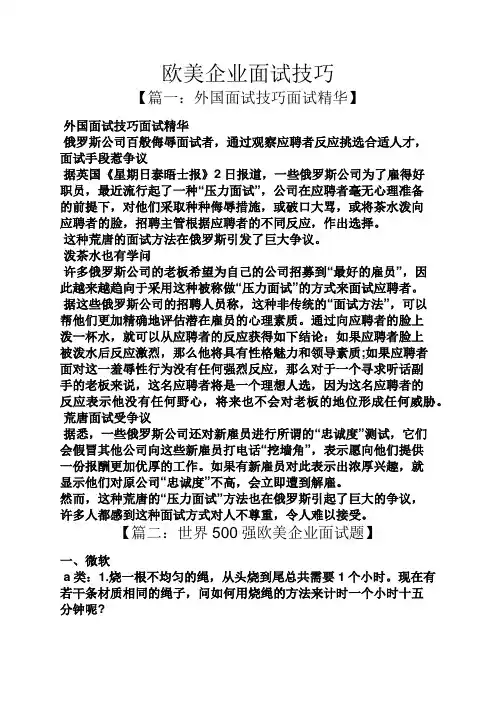
欧美企业面试技巧【篇一:外国面试技巧面试精华】外国面试技巧面试精华俄罗斯公司百般侮辱面试者,通过观察应聘者反应挑选合适人才,面试手段惹争议据英国《星期日泰晤士报》2日报道,一些俄罗斯公司为了雇得好职员,最近流行起了一种“压力面试”,公司在应聘者毫无心理准备的前提下,对他们采取种种侮辱措施,或破口大骂,或将茶水泼向应聘者的脸,招聘主管根据应聘者的不同反应,作出选择。
这种荒唐的面试方法在俄罗斯引发了巨大争议。
泼茶水也有学问许多俄罗斯公司的老板希望为自己的公司招募到“最好的雇员”,因此越来越趋向于采用这种被称做“压力面试”的方式来面试应聘者。
据这些俄罗斯公司的招聘人员称,这种非传统的“面试方法”,可以帮他们更加精确地评估潜在雇员的心理素质。
通过向应聘者的脸上泼一杯水,就可以从应聘者的反应获得如下结论:如果应聘者脸上被泼水后反应激烈,那么他将具有性格魅力和领导素质;如果应聘者面对这一羞辱性行为没有任何强烈反应,那么对于一个寻求听话副手的老板来说,这名应聘者将是一个理想人选,因为这名应聘者的反应表示他没有任何野心,将来也不会对老板的地位形成任何威胁。
荒唐面试受争议据悉,一些俄罗斯公司还对新雇员进行所谓的“忠诚度”测试,它们会假冒其他公司向这些新雇员打电话“挖墙角”,表示愿向他们提供一份报酬更加优厚的工作。
如果有新雇员对此表示出浓厚兴趣,就显示他们对原公司“忠诚度”不高,会立即遭到解雇。
然而,这种荒唐的“压力面试”方法也在俄罗斯引起了巨大的争议,许多人都感到这种面试方式对人不尊重,令人难以接受。
【篇二:世界500强欧美企业面试题】一、微软a类:1.烧一根不均匀的绳,从头烧到尾总共需要1个小时。
现在有若干条材质相同的绳子,问如何用烧绳的方法来计时一个小时十五分钟呢?(先取2跟绳,一根只点一头,另一根两头都点,等两头都点的烧完的时候将那跟点一头的另一头也点燃,烧完后在取一根,两头都点,就是一小时十五分)2.你有一桶果冻,其中有黄色、绿色、红色三种,闭上眼睛抓取同种颜色的两个。
外企面试常见问题及回答技巧随着国际化的发展,海外企业在中国的市场越来越大。
外企面试是许多求职者所渴望的机会,也是他们最需要准备的面试。
在这里,我们将讨论外企面试常见问题及回答技巧。
第一部分:常见问题1. 你能介绍一下自己吗?这是一个非常常见的面试问题。
虽然看上去简单,但其实在这个问题上展现自己的能力和经验是非常重要的。
2. 你为什么想要加入我们公司?在回答这个问题的时候,不要只是简单地说出公司的好处,更要强调,你是如何能够在这个公司中发挥实际价值的。
3. 你的优点是什么?在回答这个问题时,要结合工作中的实际操作和职务重点,因此最好提前了解这家公司的关键点。
4. 你觉得你在哪些方面需要改进?在回答这个问题时,一定要做到真诚地面对自己的不足之处。
同时,在详细解释之后,也要提到自己的改进方案,以及如何实施。
5. 你在过去的工作中有过什么挑战吗?你是如何处理的?在回答这个问题时,你应该提供具体的例子,解释你遇到问题的情况,以及你所采取的行动和结果。
第二部分:回答技巧1. 准备面试之前做好功课在参加外企面试之前,需要准备妥当。
要详细地了解公司,包括其产品和服务、公司文化和价值观。
公司的关键点也要了解清楚,以便在回答面试问题时表现得更加自信,也有针对性。
2. 独立思考并且自信外企面试是一个过程。
在回答问题时一定要沉着冷静,思考问题而非bluff,因为面试官对于求职者的专业知识或技能,或者总有一些出人意料的考订摆在面前。
当面试官提出问题时,如果不明白问题内容,就应该请求澄清,这不仅能够展示自己的学习能力和勇气,也会让面试官看到你的自信和能力。
3. 小心保持自我风格在面试中,面试官通常很忙。
确认你的反应能力和说话的速度,并要开始执行风格化的前言,每一个人都有自己的沉淀,重要的是尽量保持平静、专业,并且适当体现出自己的个性化特征,让面试官感受到你的独特魅力。
4. 展示用人单位关心的品质外企很注重多方面关注。
不仅是对语言能力和职业能力,也需要一定的交际技巧、团队协作能力,以及解决问题的能力和领导管理能力等品质。
面试技巧外国企业面试问题集锦管理资料1、我们为什么要聘用你(测试你的沉静与自信,面试技巧:外国企业面试问题集锦。
)给一个简短、有礼貌的答复:“ 我能做好我要做的事情、“我相信自己,我想得到这份工作。
2、为什么你想到这里来工作(这应该是你喜爱的题目。
)因为你在此前进行了大量的准备,你了解这家公司。
组织几个原因,最好是简短而切合实际的。
3、这个职位最吸引你的是什么(这是一个表现你对这个公司、这份工作看法的时机。
)回容许使考官确认你具备他要求的素质。
4、你是否喜欢你老板的职位答复当然是“YES ,如你不满意,可补充:“当我有这个评测能力时,或“有这样一个空缺时吧。
5、你是否愿意去公司派你去的那个地方如果你答复“NO ,你可能会因此而失掉这份工作,记住:你被雇用后你可以和公司就这个问题再行谈判。
6、谁曾经给你最大选一个名字即可,最好是你过去的老师等,再简短准备几句说明为什么。
7、你将在这家公司呆多久答复这样的问题,你该持有一种明确的态度,即:能待多久待多久,尽可能长,“我在这里继续学习和完善自己。
8、什么是你最大的成就准备一两个成功的小故事。
9、你能提供一些参考证明吗你该准备好一些相关的整洁的打印件,并有现在的和地址。
10、从现在开始算,未来的五年,你想自己成为什么样子?或者:告诉我,你事业的目标答复一定要得体,根据你的能力和经历。
11、你有和这份工作相关的训练或品质吗说明要短,举两三个最重要的品质,要有事实依据。
12、导致你成功的因素是什么答复要短,让考官自己去探究,比方只一句话:“我喜欢挑战性工作,管理资料《面试技巧:外国企业面试问题集锦》( s:// )。
13、你最低的薪金要求是多少(这是必不可少的问题,因为你和你的考官出于不同考虑都十分关心它。
)你聪明的做法是:不做正面答复。
强调你最感兴趣的是这个机遇和挑战并存的工作,防止讨论经济上的报酬,直到你被雇用为止。
14、你还有什么问题吗你必须答复“当然。
外资企业的面试技巧英文版With globalization, numerous international companies have set up their bases in different countries, including China. Working with foreign companies offers several benefits such as acquiring international exposure, high remuneration, and career progression opportunities. However, these companies expect a high level of professionalism and expertise from their employees. Therefore, getting recruited by a foreign company requires having excellent skills and abilities. The interview procedure is one of the essential factors in securing a job in an international company. The following are some tips for excelling during interviews with foreign companies.1. Research the Company and Its CultureThe first step in preparing for a job interview with a foreign company is researching the company and its culture. By understanding the company's products, values, and working culture, you can highlight your skills and abilities that match the company's requirements. Moreover, knowing about the organization's culture will help you prepare answers that align with its expectations and values.2. Learn About the IndustryApart from researching the company, you should also learn about the industry that it operates in. Understanding the latest trends, challenges, and opportunities of the sector will enable you to demonstrate your knowledge and passion during the interview.3. Be Fluent in EnglishEnglish is the primary language used in most international companies. As a result, you need to be fluent in the language and articulate in communicating your messages. Brushing up your English skills can help you build confidence during the interview.4. Emphasize Your International ExperienceInternational experience can give you an edge during a job interview with foreign companies. Highlighting your previous international work experience, such as studying abroad or working with an international team, demonstrates yourcross-cultural competence and adaptability. It also shows that you have encountered diverse situations and possess a global perspective, which are significant assets for an international company.5. Focus on Your Soft Skills and Interpersonal AbilitiesInternational companies place a high value on soft skills and interpersonal abilities since they are essential in cross-cultural collaboration, communication, and problem-solving. Highlighting your skills such as teamwork, adaptability, negotiation, andconflict management, can make you stand out in the interview process.6. Prepare for Behavioral and Scenario-Based QuestionsJob interviews with foreign companies may include behavioral and scenario-based questions that can showcase your competencies and problem-solving skills. The interviewer may ask you to describe a situation where you overcame cultural differences, how you dealt with a challenging project, or a decision you had to make in a difficult situation. Preparing for such questions and having examples to support your responses can positively impact your chances of getting hired.7. Dress ProfessionallyDressing professionally is crucial for any job interview, regardless of the company you are interviewing with. Foreign companies expect their employees to dress appropriately. Therefore, wearing business attire portrays professionalism, respect, and attentiveness towards the interview process.8. Be Confident, Courteous, and ThankfulConfidence is critical during the interview process. Being confident in your abilities and skills can impress the interviewer and lead to a favorable outcome. Additionally, being courteous and showing appreciation to the interviewer at the end of the interview can leave a positive impression and increase the probability of getting hired.In conclusion, getting recruited by a foreign company requires having excellent skills, abilities, and cross-cultural competency. By following the above tips, you can excel during the interview process and increase your chances of getting hired.。
美国公司面试技巧美国公司面试技巧在美国公司求职面试技巧有几个朋友问我在美国应聘面试的注意事项, 我就整理出了这么一篇. 如果你想好了真想给老美打工的话, 或许能帮到你. 那么, 如何对付面试呢? 如下列举了几个小技巧.1. 准备工作: 面试之前一定要认真准备, 将你的专业知识好好复习一遍. 对一些常见问题要想好如何回答. 准备工作还包括上网了解此公司业务, 甚至部门情况及其敌对公司情况. 你的这种认真态度都会使你加分的.2. 穿着打扮: 视职位情况与天气温度而定, 穿着要认真, 大方, 得体, 男士们不一定要西装格履加领带, 但也决对不能穿牛仔裤T恤衫. 有些职位较高或者做市场方面工作的人, 则讲究穿着档次较高的西服. 如果是专业技术职位, 女士们千万别浓装艳抹, 可以穿裙子, 但决不能超短.3. 答问技巧: 想好再答, 表现自信, 回答干脆, 不知道的不要装知道, 有针对性, 不要环顾左右而言它. 要将你的主见表现出来. 精力集中, 认真听问, 对听不懂或不确定的问题, 可以要求对方重复, 不要答非所问. 对一些难答的问题, 可以要求少许时间想想再答. 答问时充分利用提供给你的场地, 比如电脑,写字墙板, 笔, 纸, 等. 在答问中眼睛一定要正视对方. 可以少量掺加一些不失大雅的幽默.4. 调整心态: 对每一次面试机会, 即要势在必得, 也要放松心情. 战略上藐视面试, 战术上则要重视. 不成也没关系, 只当是一次锻炼的机会. 这样你就能做到轻松自然, 良好发挥.5. 察言观色: 有的面试人员喜欢简单扼要的答案, 有些则喜好听你讲来龙去脉, 你要学会察言观色. 随时准备添加细节, 也随时准备打住话头. 不管对方职位高低, 都决不能轻视对方. 因为在面谈过后的总结会上,每个与你交谈过的人意见都是很重要的.6. 答问一致: 很多时候, 面试的形式都是一对一的. 因此会有这种情况发生, 几个人都问你相同的.问题, 你的答案对所有的人都要保持一致, 千万别投其所好. 这种一致性可以让人感到你的诚实和责任心. 过后的总结会或许有些人会讲到面谈细节, 而你答案的不一致性会给人带来不安.7. 实事求是: 你的求职简历与实际情况一定要相符. 尤其是是你的学历与工作单位及年限. 现在有很多办法可以审核你提供的材料的真实性. 弄虚作假是要付出代价的. 至于简历上写的你曾做过的课题项目, 你可以作适当修饰, 不过, 过份的夸大其词也会露出马脚的, 那可就事得其反了.8. 逆转乾坤: 面对有些对你不利的问题, 你最好要做到巧答. 比方说, 有人问你的缺点是什么. 是人都会有缺点的, 你可以找一个不会影响到你工作质量的缺点谈谈, 谈完之后, 还可以发挥一下, 阐述你如何可以改进这项缺点并转化成工作动力.对答不出的问题, 可以说不知道, 然后给一个你知道的相关问题答案作为弥补.9. 知己知彼: 在谈话开始前, 可以要求对方简单介绍自己在公司的职位. 这样可以帮助你做到回答问题时有侧重点.10. 反向提问: 在面试的最后, 一般都会给你几分种时间讲讲你的疑问. 这是你表现自己的一个很重要的机会, 千万别放弃. 通过前面的谈话, 你可以问一些技术问题(表示你好学), 也可以讲讲你从网络中看到的公司情况(表现你对公司的极大兴趣), 或者问问刚才你感到回答不完美的问题答案(表现谦虚).另外, 美国人特别讲究隐私, 所以你千万别问对方的个人及家庭情况, 除非他自己提起.11. 工资要求: 至于工资要求, 视你的具体情况而定. 如果你真想要这份工作, 你可以说就按公司常规给就行, 不要讲具体数字. 如果你是想提薪跳槽, 你可以告诉他们你目前的工资状况, 及你要求增加的额度, 或者直接说一个你满意的数目.。
国外商业面试题目及答案(注意:以下内容仅为示例,实际内容需根据题目仔细考虑而定)1. 为什么你对本公司感兴趣?答案:我对贵公司感兴趣的原因有三。
首先,我对贵公司所经营的行业非常感兴趣,并且一直以来都在关注贵公司的发展。
其次,我了解到贵公司的企业文化和价值观与我个人的价值观相契合。
最后,贵公司在市场上的影响力以及其在行业内的领导地位让我对加入贵公司充满了信心。
2. 在商业环境中,你认为最重要的技能是什么?答案:在商业环境中,我认为最重要的技能是沟通能力。
一个优秀的沟通者能够建立良好的人际关系并有效地传达信息。
良好的沟通能力可以确保团队间的协作效率以及客户与企业之间的理解和满意度。
此外,沟通能力也对于解决问题、处理冲突和实现目标非常重要。
3. 假设你与一个团队成员发生意见分歧,你将如何处理?答案:当我与团队成员发生意见分歧时,我会采取以下步骤:首先,我会耐心倾听对方的意见,并确保我正确理解了对方的观点。
然后,我会提出我自己的观点,并试图找到双方观点的共同点。
接下来,我会与对方积极地讨论,并探索找到最佳解决方案的可能性。
最后,我会尊重团队的决策,并与团队成员一起努力实施。
4. 你在过去的工作中遇到过失败的经历吗?你是如何应对的?答案:在过去的工作中,我曾经遇到了一次失败的经历。
当时,我负责一个项目,但是由于团队成员之间的沟通不畅以及时间安排不合理,导致项目延误并没有按时完成。
面对这个失败,我首先反思自己的责任,并从中吸取教训。
然后,我与团队成员进行了深入的交流,分析问题的根源,并制定了一套新的项目管理计划。
最后,我带领团队按照新的计划重新启动项目,并通过更有效的沟通和时间管理确保项目的顺利进行。
5. 在一个跨文化的团队中,你遇到过如何处理文化差异的情况吗?答案:是的,我在之前的工作中遇到过跨文化团队的情况。
面对文化差异,我首先努力学习和理解不同文化之间的差异,并且尊重不同文化的观点和做事方式。
我会与团队成员进行积极的沟通,以了解彼此的文化价值观,并寻找共同的工作方式。
欧美企业面试题及面试技巧篇一:世界500强欧美企业面试题一、微软A类:1.烧一根不均匀的绳,从头烧到尾总共需要1个小时。
现在有若干条材质相同的绳子,问如何用烧绳的方法来计时一个小时十五分钟呢?(先取2跟绳,一根只点一头,另一根两头都点,等两头都点的烧完的时候将那跟点一头的另一头也点燃,烧完后在取一根,两头都点,就是一小时十五分)2.你有一桶果冻,其中有黄色、绿色、红色三种,闭上眼睛抓取同种颜色的两个。
抓取多少个就可以确定你肯定有两个同一颜色的果冻?(5秒-1分钟)3.如果你有无穷多的水,一个3公升的提捅,一个5公升的提捅,两只提捅形状上下都不均匀,问你如何才能准确称出4公升的水?(40秒-3分钟)(1,用5升桶满桶,倒入3升桶中,倒满后大桶里剩2升;2,把3升桶倒空,把那2升倒入3升桶中。
3,用5升桶满桶再向3升里倒,倒入一升就满,大桶里剩下的是4 升) 4.一个岔路口分别通向诚实国和说谎国。
来了两个人,已知一个是诚实国的,另一个是说谎国的。
诚实国永远说实话,说谎国永远说谎话。
现在你要去说谎国,但不知道应该走哪条路,需要问这两个人。
请问应该怎么问?(20秒-2分钟) (问“你的国家怎么走?”他们都会指向诚实国)5.12个球一个天平,现知道只有一个和其它的重量不同,问怎样称才能用三次就找到那个球。
13个呢?(注意此题并未说明那个球的重量是轻是重,所以需要仔细考虑)(5分钟-1小时) (先将球分三组A,B,C,每组四个,随便称两组,如果天平平衡则在另一组中,假设另一组是c,再从c组的四个中随便挑两个称,如果平衡,则在另外两个中,从中挑一个与称过的两个中一个比较,会得到答案)6.在9个点上画10条直线,要求每条直线上至少有三个点?(3分钟-20分钟) (先把点摆成3*3的方阵,把中间一行的两侧的点分别向里移两点间距的二分之一此时的九点,可画出十条直线,每条直线上三点)7.在一天的24小时之中,时钟的时针、分针和秒针完全重合在一起的时候有几次?都分别是什么时间?你怎样算出来的?(1:05之后有一次,2:10之后有一次,3:15之后有一次,4:20之后有一次,5:25之后有一次,6:30之后有一次,7:35之后有一次,8:40之后有一次,9:45之后有一次,10:50之后有一次,12:00整有一次。
24小时之中总共22次) B类:1.为什么下水道的盖子是圆的?2.中国有多少辆汽车?3.将汽车钥匙插入车门,向哪个方向旋转就可以打开车锁?4.如果你要去掉中国的34个省(含自治区、直辖市和港澳特区及台湾省)中的任何一个,你会去掉哪一个,为什么?5.多少个加油站才能满足中国的所有汽车?6.想象你站在镜子前,请问,为什么镜子中的影象可以颠倒左右,却不能颠倒上下?7.为什么在任何旅馆里,你打开热水,热水都会瞬间倾泻而出?8.你怎样将Excel的用法解释给你的奶奶听?9.你怎样重新改进和设计一个ATM银行自动取款机?10.如果你不得不重新学习一种新的计算机语言,你打算怎样着手来开始?11.如果你的生涯规划中打算在5年内受到奖励,那获取该项奖励的动机是什么?观众是谁?12.如果微软告诉你,我们打算投资五百万美元来启动你的投资计划,你将开始什么样商业计划?为什么?13.如果你能够将全世界的电脑厂商集合在一个办公室里,然后告诉他们将被强迫做一件事,那件事将是什么?C类:1.你让工人为你工作7天,回报是一根金条,这个金条平分成相连的7段,你必须在每天结束的时候给他们一段金条。
如果只允许你两次把金条弄断,你如何给你的工人付费?2.有一辆火车以每小时15公里的速度离开北京直奔广州,同时另一辆火车每小时20公里的速度从广州开往北京。
如果有一只鸟,以30公里每小时的速度和两辆火车同时启动,从北京出发,碰到另一辆车后就向相反的方向返回去飞,就这样依次在两辆火车之间来回地飞,直到两辆火车相遇。
请问,这只鸟共飞行了多长的距离?3.你有四个装药丸的罐子,每个药丸都有一定的重量,被污染的药丸是没被污染的药丸的重量+1。
只称量一次,如何判断哪个罐子的药被污染了?4.门外三个开关分别对应室内三盏灯,线路良好,在门外控制开关时候不能看到室内灯的情况,现在只允许进门一次,确定开关和灯的对应关系?5.人民币为什么只有1、2、5、10的面值?6.你有两个罐子以及50个红色弹球和50个蓝色弹球,随机选出一个罐子,随机选出一个弹球放入罐子,怎么给出红色弹球最大的选中机会?在你的计划里,得到红球的几率是多少?D类:1.五个海盗抢到?00颗宝石,每一颗都一样大小和价值连城。
他们决定这么分:抽签决定自己的号码(1、2、3、4、5)首先,由1号提出分配方案,然后大家表决,当且仅当超过半数的人同意时,按照他的方案进行分配,否则将被扔进大海喂鲨鱼如果1号死后,再由2号提出分配方案,然后剩下的4人进行表决,当且仅当超过半数的人同意时,按照他的方案进行分配,否则将被扔入大海喂鲨鱼依此类推。
条件:每个海盗都是很聪明的人,都能很理智地做出判断,从而做出选择。
问题:第一个海盗提出怎样的分配方案才能使自己的收益最大?2.一道关于飞机加油的问题,已知:每个飞机只有一个油箱,飞机之间可以相互加油(注意是相互,没有加油机)一箱油可供一架飞机绕地球飞半圈,问题:为使至少一架飞机绕地球一圈回到起飞时的飞机场,至少需要出动几架飞机?(所有飞机从同一机场起飞,而且必须安全返回机场,不允许中途降落,中间没有飞机场)E类:1.某手机厂家由于设计失误,有可能造成电池寿命比原来设计的寿命短一半(不是冲放电时间),解决方案就是免费更换电池或给50元购买该厂家新手机的折换券。
请给所有已购买的用户写信告诉解决方案。
2.一高层领导在参观某博物馆时,向博物馆馆员小王要了一块明代的城砖作为纪念,按国家规定,任何人不得将博物馆收藏品变为私有。
博物馆馆长需要如何写信给这位领导,将城砖取回。
3.营业员小姐由于工作失误,将2万元的笔记本电脑以1.2万元错卖给李先生,王小姐的经理怎么写信给李先生试图将钱要回来?二、google1、一个经理有三个女儿,三个女儿的年龄加起来等于13,三个女儿的年龄乘起来等于经理自己的年龄,有一个下属已知道经理的年龄,但仍不能确定经理三个女儿的年龄,这时经理说只有一个女儿的头发是黑的,然后这个下属就知道了经理三个女儿的年龄。
请问三个女儿的年龄分别是多少?为什么?2、有三个人去住旅馆,住三间房,每一间房$10元,于是他们一共付给老板$30,第二天,老板觉得三间房只需要$25元就够了于是叫小弟退回$5给三位客人,谁知小弟贪心,只退回每人$1,自己偷偷拿了$2,这样一来便等于那三位客人每人各花了九元,于是三个人一共花了$27,再加上小弟独吞了不$2,总共是$29。
可是当初他们三个人一共付出$30那么还有$1呢?3、有两位盲人,他们都各自买了两对黑袜和两对白袜,八对袜了的布质、大小完全相同,而每对袜了都有一张商标纸连着。
两位盲人不小心将八对袜了混在一起。
他们每人怎样才能取回黑袜和白袜各两对呢?4、有一辆火车以每小时15公里的速度离开洛杉矶直奔纽约,另一辆火车以每小时20公里的速度从纽约开往洛杉矶。
如果有一只鸟,以30公里每小时的速度和两辆火车同时启动,从洛杉矶出发,碰到另一辆车后返回,依次在两辆火车来回飞行,直到两辆火车相遇,请问,这只小鸟飞行了多长距离?5、你有两个罐子,50个红色弹球,50个蓝色弹球,随机选出一个罐子,随机选取出一个弹球放入罐子,怎么给红色弹球最大的选中机会?在你的计划中,得到红球的准确几率是多少?6、你有四个装药丸的罐子,每个药丸都有一定的重量,被污染的药丸是没被污染的重量+1.只称量一次,如何判断哪个罐子的药被污染了?7、你有一桶果冻,其中有黄色,绿色,红色三种,闭上眼睛,抓取两个同种颜色的果冻。
抓取多少个就可以确定你肯定有两个同一颜色的果冻?8、一群人开舞会,每人头上都戴着一顶帽子。
帽子只有黑白两种,黑的至少有一顶。
每个人都能看到其它人帽子的颜色,却看不到自己的。
主持人先让大家看看别人头上戴的是什幺帽子,然后关灯,如果有人认为自己戴的是黑帽子,就打自己一个耳光。
第一次关灯,没有声音。
于是再开灯,大家再看一遍,关灯时仍然鸦雀无声。
一直到第三次关灯,才有劈劈啪啪打耳光的声音响起。
问有多少人戴着黑帽子?点击查看》义乌前沿人才网最新招聘信息9、对一批编号为1~100,全部开关朝上(开)的灯进行以下*作:凡是1的倍数反方向拨一次开关;2的倍数反方向又拨一次开关;3的倍数反方向又拨一次开关…问:最后为关熄状态的灯的编号。
10、想象你在镜子前,请问,为什么镜子中的影像可以颠倒左右,却不能颠倒上下?在欧洲,许多跨国公司和集团向社会招聘员工时都委托知名的顾问公司或招聘办公室代理。
在企业老板们看来,这种招聘方式虽然昂贵些,但具有专业性、权威性和公正性,属于可信赖的途径。
最近,比利时互斯顿招聘办公室的专家维尔斯先生,就如何适应市场游戏规则、提高应聘者成功的几率,提出了一系列参考建议。
不要一一罗列自己的学历维尔斯先生说,求职者首先应搞清楚什么职业最适合自己,以及自己的兴趣所在和优势。
然后应大量浏览和收集与自己专业有关的企业的文章,善于从媒体的报道中挖掘潜在信息,因为一家企业的重组、搬迁,都可能意味着有招聘机会。
一旦确定了目标,应该给有关企业直接发邮件联系,甚至可以通过电话沟通。
求职者首先必备的是一份简历、一份求职信。
维尔斯先生认为,一份"推销"自己的简历一两页纸就够了,冗长的简历往往会被招聘人员随手搁置一旁。
简历要避免错字、别字和拼写错误;要突出自己的能力,不过,不要把过去了很久的学历再一一罗列,但可以突出曾经任过职的重要机构或师从的知名教授。
简历不要花里胡哨,不宜带任何图案的点缀,以免被企业的服务器当作病毒拒收。
寄简历的同时,应附上一封简要的求职信,概述一下自己的目标和愿望,再简述自己的经历和能力。
不要同时给多家企业发千篇一律的求职信,否则会不被理睬。
应聘一家企业,事先要反复阅读该企业的网站,留意他们的用词和用语。
假如"挑战"、"竞争"这样的词出现多次,求职者不妨在信中阐述自己喜欢"挑战"和不畏"竞争"。
面试时,鞋子很重要维尔斯先生说:"我们很注意观察应聘者的行为举止。
当应聘者来到房间后,我会注意观察他是否等我请他坐下时再坐。
"很多求职者并不知道,招聘者对衣着的观察尤其细致,谁都知道不能穿一件花衬衣和五颜六色的袜子去面试,虽然西服、领带显得有点严肃,但还是最好的着装。
鞋子很重要。
在许多招聘者的眼里,鞋子反映出一个人的个性。
如果皮鞋鞋面磨损,会被看作是不注意整洁和不拘小节的人;皮鞋过于新潮,会被当作喜欢引人注目,对求职于需要显得庄重的银行、顾问之类的工作岗位很不利。